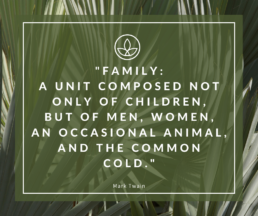If You Can't Move - How Can You Stay Close?
Every year millions of Americans make the decision to move. The number one reason? The yearning to be closer to family.
There is actually a new movement called “The Grandparent Migration” that is supported by NAR facts and figures – read more here.
This desire is often driven by life’s significant milestones such as growing families, weddings, new jobs, retirements or being with grandchildren.
If living closer to family isn’t possible right now, there are ways that you can strengthen those bonds. This month we are sharing some of those ideas as well as interesting statistics and information from the United State Surgeon General Dr. Vivek Murthy.
“Our epidemic of loneliness and isolation has been an underappreciated public health crisis that has harmed individual and societal health. Our relationships are a source of healing and well-being hiding in plain sight – one that can help us live healthier, more fulfilled, and more productive lives,” said U.S. Surgeon General Dr. Vivek Murthy. “Given the significant health consequences of loneliness and isolation, we must prioritize building social connection the same way we have prioritized other critical public health issues such as tobacco, obesity, and substance use disorders. Together, we can build a country that’s healthier, more resilient, less lonely, and more connected.” Click here to download the U.S. Surgeon General’s Advisory for the Healing Effects of Social Connection and Community.
That is really what Homegrown Group is all about! Using real estate to Grow Communities, gardens, relationships, and lives.
Here are some surprising statistics from the United States Department of Health and Human Services about how your physical health is impacted, as well as your mental health – “The physical health consequences of poor or insufficient connection include a 29% increased risk of heart disease, a 32% increased risk of stroke, and a 50% increased risk of developing dementia for older adults. Additionally, lacking social connection increases risk of premature death by more than 60%.”
So, what can we do – if we can’t move to be closer to family? Here are 6 suggestions for positive steps to stay in touch with the people, family or not, that you care about.
1.) Start a group chat. Give it an identity with a special name and a picture. Keep it positive by sharing recipes, podcasts, inspiring quotes, and fun pictures. Keep it meaningful by sharing the days highs and lows, and requests for prayer.
2.) Celebrate small holidays through sending cards or personalized letters. Everyone loves getting good old snail mail. Think of recognizing the fun National Days Calendar that your group may enjoy, surely there is something on there for everyone.
3.) Send a homemade care package when someone is feeling under the weather. It can be as simple as some homemade cookies or use a website to pick out some special items to meet the need. One that we like is Spoonful of Comfort.
4.) Let someone know how important they are to you, by keeping a list of their Favorite Things and every once in a while – on a random – I am thinking of you day, pop something in the mail. It will really work to bridge the gap in miles and time.
5.) Start a shared digital photo album for just your special group. Have one for each year and encourage everyone to share experiences, fun photos, even memes and videos. This becomes a great way of preserving memories and having a more private alternative to regular social media.
6.) Have a scheduled group video chat time. Be creative! You can do music together, have a Zoom book club, show someone how to make a recipe or plant a flower. Plan a month ahead of time and come up with a communal activity and then report back during the call. This can widen the scope of communication and bonding by sharing a common experience.
If this information gets you thinking that maybe it is the right time to consider a move, please feel free to reach out to us and we can chat about possible options. We’re always here to respond to any questions you or your family may have related to real estate or living in Northeast Florida.

